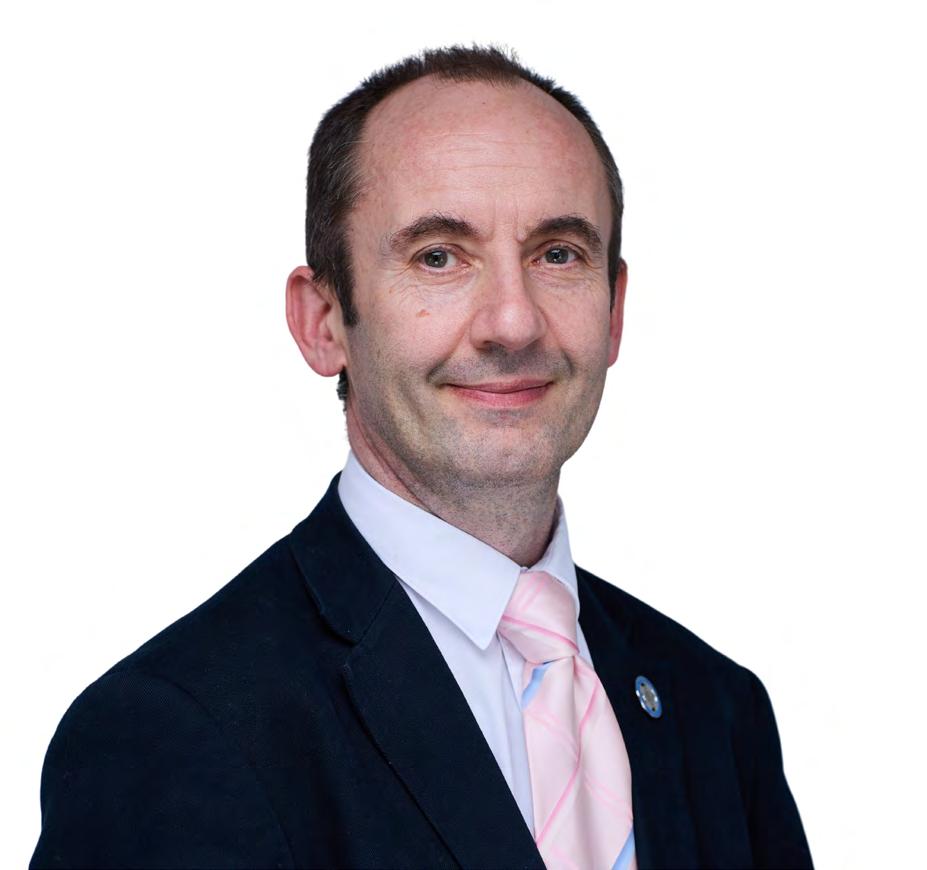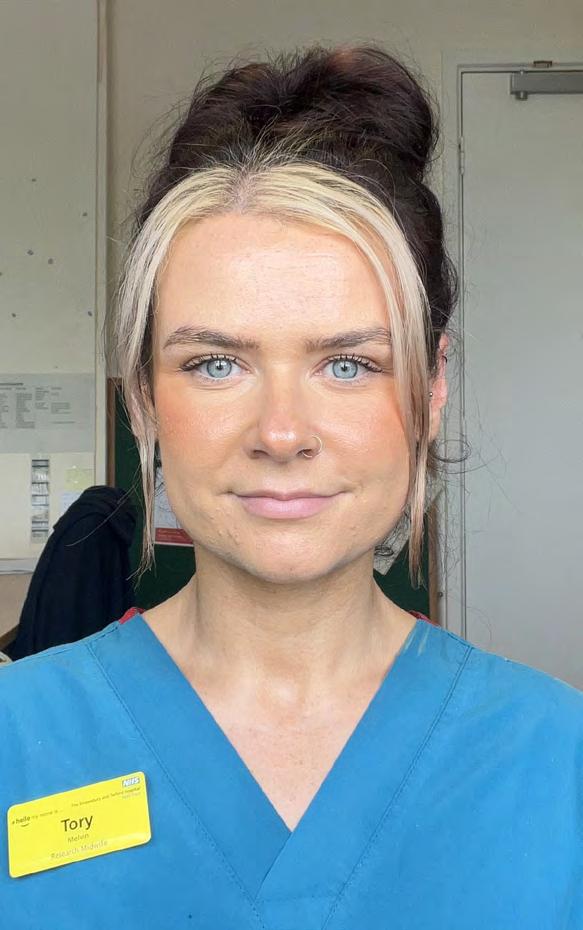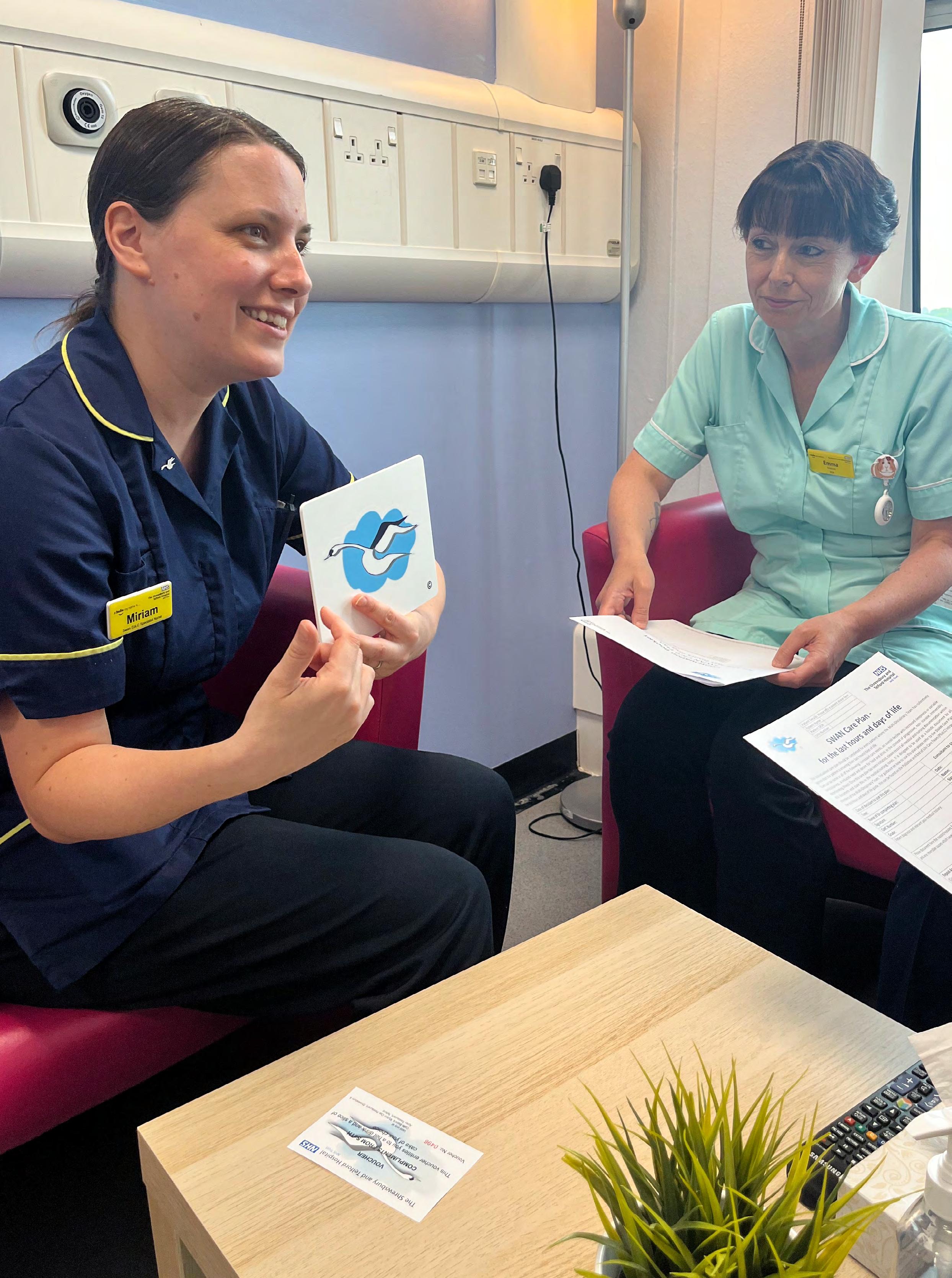



Issue 15 Trial Success Patient Care Carbon Footprint Research Improving Reducing our Page 4 Page 6 Page 11 IMPACT Partnering Ambitious Caring Trusted Research, Innovation & Improvement Week Special

 Louise Barnett, Chief Executive Dr John Jones, Executive Medical Director
Louise Barnett, Chief Executive Dr John Jones, Executive Medical Director
Our annual Research, Innovation and Improvement Week provided a fantastic opportunity for us to celebrate our commitment of putting research, innovation and improvement at the heart of what we do, for our patients, communities and each other.
This dedicated week gives you the chance to learn more about what is taking place across our organisation, and also provides the perfect opportunity for you to get involved and bring forward your own ideas.
Throughout the event, colleagues have been taking part in networking meetings and an interactive session where they were able to discuss their own ideas with external partners, including Keele University and the Clinical Research Network.
The week culminated with the SaTH Research, Innovation and Improvement Conference which celebrated the impact that improvement and research is having on patients and colleagues.
Colleagues were able to gain insight into the importance of improvement and research and
think about the opportunities this could bring to their own areas and departments. It was also fantastic to hand out awards thanking outstanding contributors to improvement and research over the past year. We will share our award winners in a future edition of Impact.
NHS IMPACT (Improving Patient Care Together) is the new, single, shared NHS improvement approach. By creating the right conditions for continuous improvement and high performance, systems and organisations can respond to today’s challenges, deliver better care for patients and give better outcomes for communities.
We have contributed to this new and exciting national guidance and will be using it to shape our improvement offer in the future.
Research and innovation
help us to determine the best treatments and play a vital part in the care we deliver. There is a huge amount of research and innovation happening across the Trust – often quietly, behind the scenes – and we must not underestimate the difference this is making to our communities.
This edition of Impact focuses on some of the brilliant stories of research, innovation and improvement we are involved in. From a fertility trial that is proving successful on page 4 to new effective processes that are reducing our environmental impact on page 11. It is fantastic to see so much work going on, driven by your energy and enthusiasm, and the difference this is making to our patients.
Thank you.
Impact Magazine - Issue 15 2

Impact Magazine - Issue 15 3
RESEARCH TRIAL SUCCESS
Research helps us to determine the best treatments for our patients, and this is especially true for families we have supported on their fertility journey.
Our organisation is part of the LOCI study which was created to support women and families struggling to conceive due to polycystic ovary syndrome (PCOS).
PCOS is a common condition that affects 20% of women due to how their ovaries work. It can result in irregular periods, hormone imbalance and polycystic ovaries – all of which can impact on fertility.
The first line of treatment for PCOS is a medication called clomifene. Current clinical guidelines in the UK recommend the use of clomifene with or without another medication, metformin, for a maximum of six menstrual cycles.
Recently there has been growing interest in the use of a new medication, letrozole, to treat infertility in women with PCOS. Letrozole works differently to clomifene and has fewer side effects, including a lower risk of multiple pregnancy.
The LOCI trial, developed in consultation with Fertility Network UK and the Women’s Network of the Royal College of Obstetricians and Gynaecologists (RCOG), involves the

patient being allocated either clomifene or letrozole, with or without metformin for up to six treatment cycles.

The allocation of treatment is decided at random by a computer, and neither the participants nor the researchers know what treatment a patient is receiving; this arrangement is necessary to test the treatments fairly.
SaTH is a proud participant of the LOCI trial and colleagues in the Fertility Unit are collaborating with the Research and Innovation Team to support many women and families through the study.

“I have worked on the LOCI trial since 2022 and it has been a real joy to work on. Our original target was to recruit 20 women, and we managed to recruit 42 which is a fantastic achievement. We have had 11 pregnancies, and, so far, six babies. It has been a real privilege to support these women and their families through the start of their fertility journey. Infertility affects one in six couples, so this is an important research question that needs answering.
“We are very proud to have been part of a trial that may give some muchneeded answers to these patients and help to inform us on the best options for those struggling to conceive.”
Tory Melvin, Research Midwife
OUR GETTING TO GOOD IMPROVEMENT JOURNEY
Caring Impact Magazine - Issue 15 4

Cara Meehan and baby Luca
Cara was diagnosed with PCOS several years ago which affected her fertility and left her without a period for two years. After seeking support from various avenues Cara was told about the trial and jumped at the chance of trying something that may help her become a mother.
Cara started the trial in September 2022. Her research midwife, Tory, was with her every step of the way. Each month as her period arrived, she felt a wave of disappointment that her chances were disappearing.
Cara fell pregnant on her sixth and final cycle and gave birth to little boy, Luca, at 8.07pm on 20 January 2024. Luca weighed 9lb 02oz.
Cara said: “I couldn’t believe it when I saw the lines on the pregnancy test. It was something I had wanted for such a long time so to have it finally happen was surreal.
“I called my research midwife, Tory, and I could hear her and the team cheering down the phone. I felt so supported from the get-go.
“My pregnancy flew by with minimal issues and the birth was magical. My brilliant midwife, Steph, was just fantastic, as well as my community midwife, Ally. I felt so cared for and looked after.
“I feel so privileged to have been part of this trial. It was my lifeline. Not only have I got something huge out of it, but I feel like I’ve been part of something incredible and given something back for other women and future generations.
“I just can’t believe little Luca is here and he’s ours. It’s been so worth the journey, and quite simply, it’s changed our lives.”
The LOCI trial is just one of the many impactful research trials currently being conducted across both sites by the Research and Innovation Team.
OUR GETTING TO GOOD IMPROVEMENT JOURNEY
Caring Impact Magazine - Issue 15 5

IMPROVING PATIENT CARE
Innovative ideas from colleagues are helping to improve the timeliness of care we provide to our patients.
One example is on Ward 22 (short stay) at RSH which regularly cares for patients who require a lumbar puncture procedure for diagnosing or treating a condition.
With equipment and documentation located in multiple places and on the intranet, there could sometimes be delays to the procedure taking place. Housekeeper Jackie Jones recognised this and came up with the simple and effective time-saving idea of creating lumbar puncture procedure ‘grab bags’.
All the equipment and documentation is now put
into a pre-made ‘grab bag’ in the storeroom. The clinician undertaking the procedure can simply ‘grab’ a bag and go directly to the patient.
This has resulted in a reduction in the amount of time it takes to source the equipment and documentation.
A case study was undertaken and established that the time taken to obtain the necessary equipment and documentation required for a lumbar puncture procedure had reduced by 75% since the introduction of the bags.
OUR GETTING TO GOOD IMPROVEMENT JOURNEY Ambitious
Impact Magazine - Issue 15 6
OUR GETTING TO GOOD IMPROVEMENT
“Doctors were spending a lot of time asking me to find the right needles, which was wasting time for them and me. I asked the doctors whether they would like me to make them up a pack in advance so it would be easier for them to grab the pack.
“There are benefits for the doctors, and also for the patients, as it is reducing the amount of time it takes to get all the equipment together and they are getting to the patients much quicker.
“Now, for example, if a doctor needs to do the procedure in the middle of the night they can just come in here and the ‘grab bags’ are ready to go.”
Jackie Jones, Housekeeper


JOURNEY
Impact Magazine - Issue 15 7
Ambitious
SUPPORTING THE DELIVERY OF END OF LIFE CARE
Our priority is to deliver excellent care to our patients who are at end of life, and their families.
To support ward colleagues in providing end of life care, our fantastic colleagues in the Palliative and End of Life Care (PEoLC) team have developed a Supportive Ward Visit programme.
The programme identifies any areas for improvement so the PEoLC team can provide focused support over several weeks. The aim is to support clinical areas to increase their confidence and knowledge in providing palliative and end of life care to our patients.
Prior to the programme starting, the ward manager meets with their team to review and determine areas of focus.
These can include:
• The Swan Model of Care and Swan Fundamentals
• Increasing confidence and knowledge in using the Swan Care plan, including completion of the comfort chart
• Increasing mandatory training compliance on e-Learning for end of life care, care after death and syringe pump training modules
Ward 17 (Respiratory) took part in the programme and whilst the team found that knowledge of the Swan fundamentals was high in these areas already, colleagues were still able to make further improvements.
The team utilised the Swan Fund to buy a mood light and DAB radio with bluetooth to enable music to be played to patients.
Ward 17 was gifted a ‘thank you board’ by the PEoLC team to enable them to share positive feedback from families for their care and support.

OUR GETTING TO GOOD IMPROVEMENT JOURNEY Ambitious
Impact Magazine - Issue 15 8

“It has been wonderful to get to know the team. There is a real passion to deliver excellent care and colleagues have been open and honest, and have also been bringing ideas to the table to make more improvements within the ward area.”
Miriam Gilbert, Swan End of Life Care Nurse Specialist

GETTING TO GOOD IMPROVEMENT JOURNEY
OUR
Ambitious
Impact Magazine - Issue 15 9

IMPROVING EFFICIENCY
Ward rounds are an essential part of patient care ensuring their journey through our hospitals is as smooth as possible.
During a local audit on Ward 25 at RSH, it was identified that approximately half of all patient medication charts were not readily available during ward rounds.
The charts are needed to ensure correct dose of medication and correct treatment, and it meant that colleagues sometimes had to stop the rounds to locate the charts. This resulted in ward rounds taking longer than necessary.
Rakshanda Sadavarte, Deanery FY1, researched the cause, and put in place an idea that has helped to improve the availability of medication charts during ward rounds.
The aim was to decrease the number of charts not readily available during the ward round to 40%. The way the ward achieved this was by a three-way tray system for patient medication charts.
Each tray was allocated to a bay on the ward and all charts were stored there unless in use. The trays
were placed in an easy and accessible area in the nursing station which didn’t get in the way of normal day to day activities.
All colleagues including nursing colleagues, pharmacists and junior doctors, had the new process explained to them and have put it into practice.
The system was tested over a two-week period and the three-way tray process had lots of positive feedback from colleagues.
Mandie Esp, Ward Manager, said “We have had this this system in place for a while now as it was successful. With this system everyone knows where the charts are if they are needed during the ward rounds.”
A further audit shows continuous improvement – and this has resulted in less time spent locating charts during ward rounds which is having a positive impact on patient care.
OUR GETTING TO GOOD IMPROVEMENT JOURNEY
Ambitious Impact Magazine - Issue 15 10
REDUCING OUR CARBON FOOTPRINT
A project rolled out at PRH to streamline the disposal of waste is helping to reduce our carbon footprint and also make financial savings.
As part of the NHS Clinical Waste Strategy, it is crucial for NHS organisations to reduce the financial cost and carbon emissions produced by the disposal of waste.
Mark Leighton, Waste and Energy Manager, is driving this improvement at SaTH. He has put in place new processes for more effective segregation, raised awareness of the different waste streams and the need to reduce the amount of clinical waste sent for incineration which is both financially and environmentally costly.
A national colour coding system was rolled out across PRH to support this. Coloured bins bags and clear signage have been placed on the walls above the clinical waste bins to help prevent the mixing of waste.
To support the roll out, Mark attended nursing staff huddles, domestics, housekeepers and AHP monthly meetings and also spoke to ward managers and portering staff individually to raise awareness of the importance of correctly separating waste.
This project was started at PRH in December last year. Since then, the production of offensive waste has increased by an average of 20 tonnes per month, whereas infectious waste has decreased by

the same amount due to correctly classifying and segregating the waste produced.
These changes have resulted in a cost saving of approximately £3,200 a month or £38,400 a year.
The same project is now being rolled out across the RSH site, and then on to our satellite sites.

“The NHS Clinical Waste Strategy is vitally important for reducing both the high disposal costs of clinical waste, and our carbon footprint. It also allows for better staff awareness of the importance and legal requirements of correct waste segregation and disposal.
“It would not have been possible to implement without the help and outstanding commitment from cleanliness, portering, housekeeping and clinical staff throughout the Trust.”
Mark Leighton, Waste and Energy Manager
OUR GETTING TO GOOD IMPROVEMENT JOURNEY
Ambitious Impact Magazine - Issue 15 11
 Jo Sawyer, Head of Research & Innovation
Jo Sawyer, Head of Research & Innovation
“We are working across our hospitals to improve access to high quality studies that improve the care and treatments we offer. We are passionate about empowering patients, carers, the public and colleagues to be part of research and have a voice in the future vision of healthcare.”
Contact the Research and Innovation Team at sath.research@nhs.net
 James Owen, Deputy Director of Education and Improvement
James Owen, Deputy Director of Education and Improvement
“One of our aims is to empower colleagues at all levels to have the confidence, capability, passion and knowledge to test changes and make improvements for our patients, communities and each other. We have seen many great examples of this during Research, Innovation and Improvement Week and I hope these will inspire others to test changes and further improve how we deliver our services.”
If you have an improvement idea, please contact the team at sath.improvementhub@ nhs.net.
Impact Magazine - Issue 15 12

In our next edition we will be focusing on:
• CQC next steps
• Improving Urgent and Emergency Care together
• Getting it right first time in Cardiology
• Moving forward on our digital journey
• Opening the new Elective Hub at PRH

G Impact Magazine - Issue 15 13





 Louise Barnett, Chief Executive Dr John Jones, Executive Medical Director
Louise Barnett, Chief Executive Dr John Jones, Executive Medical Director















 Jo Sawyer, Head of Research & Innovation
Jo Sawyer, Head of Research & Innovation
 James Owen, Deputy Director of Education and Improvement
James Owen, Deputy Director of Education and Improvement

